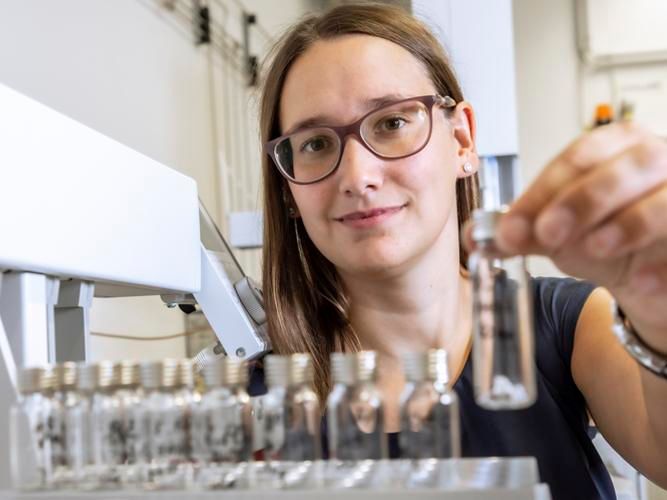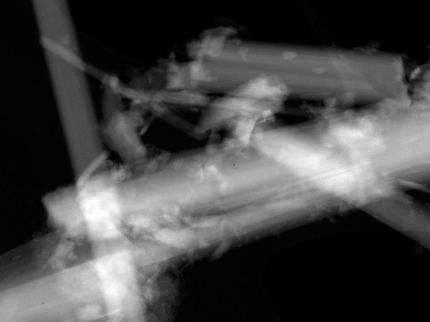Sniffing out carcinogens in foodstuffs
Andrea Hochegger, an analytical chemist at TU Graz, investigates whether foodstuffs can be tainted with harmful substances from packaging or during production
Andrea Hochegger’s current research focus is the question of contamination with mineral oil hydrocarbons. “We break up complex mixtures into MOSH and MOAH fractions,” Andrea explains. These are groups of chemical compounds found in mineral oil. MOSH stands for mineral oil saturated hydrocarbons and MOAH for mineral oil aromatic hydrocarbons.

Andrea Hochegger at her laboratory
Lunghammer – TU Graz
So far, little research has been carried out into their effects on humans. However, researchers are fairly certain that MOAH fractions are carcinogenic, meaning they should not be present in food. These are just one of the substances Andrea Hochegger is on the lookout for. “Food can contain residues from production, like lubricants from machinery, or auxiliary materials from production processes. But contaminants can also come from packaging,” she points out. “Some of these substances are carcinogenic, which means they can cause cancer.” In her research Andrea analyses a wide variety of foodstuffs – from dry products such as rice and flour to edible oils and fats, as well as ready-made products. She also provides important feedback to manufacturers about potential sources of contamination and how to avoid them. Now she is taking things a step further: “These substances contain thousands of different chemical compounds, and it’s unclear which of them are carcinogenic.” This is the question that the young researcher is aiming to answer.
She also shares her expertise with international bodies. “We were involved in drafting a new standard to regulate MOSH and MOAH in fats and oils, which will hopefully be published in spring 2023.”
Internship at cellulose factory
Andrea Hochegger’s interest in analytical chemistry was sparked by a summer job at a food packaging laboratory in a well-known cellulose factory in her home town. Back then, she had the task of developing a high-performance liquid chromatography (HPLC) method for the identification of substances through analysis. The 28-year-old researcher wrote her doctoral thesis in conjunction with the Institute of Bioproducts and Paper Technology. Her topic was functional, bio-based barrier substances, which stop food aromas, contaminants and moisture from permeating packaging made from paper.
Recycling food packaging
She already has plans for further research in the future – she wants to investigate food packaging and plastic recycling. “There’s a major problem: the more often we recycle a material, the more contaminants are produced or find their way into the material.” Also, there’s more to plastic than just plastic – it can be made from a host of different materials and material combinations. This is not such a problem with PET bottles, which can be recycled to make new ones by means of a closed-loop process. “This is why PET is the most widely recycled type of plastic used in food packaging.” Things are more complicated with other materials such as the foils used in supermarkets to wrap fruit and vegetables. “Here, it’s just not possible to use a closed-loop approach because these materials are highly complex and specific. Each product is made from different polymers, and some of them include several layers, each of which are designed to protect aromas against water, oxygen and the like. This makes recycling much more difficult.”
Andrea also sees her future in research and is aiming to find a tenure-track position. “I love the combination of research and teaching. Especially in the basic research labs in the first semester – it’s a pleasure and also really fascinating to be there when the young students go into a proper laboratory for the first time,” she says with a smile.
Andrea still has some time before she starts out on her next research project. And she’s just finished building a house as well. “So the enjoyable part – being in the garden, barbecues and enjoying the great outdoors – is just beginning.”




















































